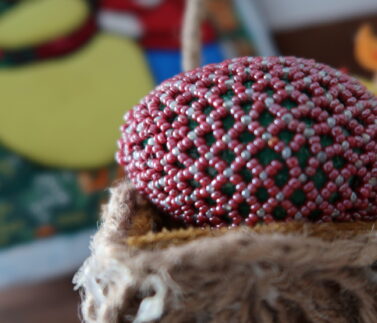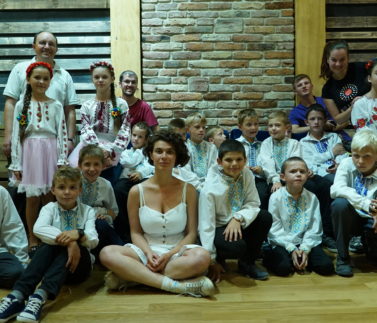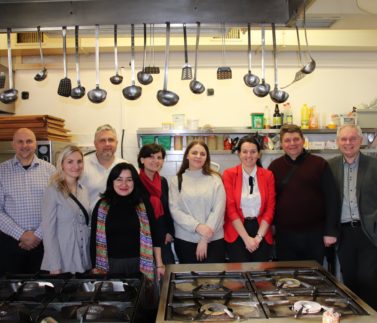
Seven wonders, marshrutkas and wild nature. This is also Ukraine
Holeshov – Wooden churches which were built without nails, marshrutkas that travel the streets without a timetable, wild nature, lots of castles and fortresses, hospitable people. This is also Ukraine. Tips for a trip as well as the current situation in the country and ways of helping – that all was presented by Khrystyna Novodvorska from the Archdiocesan Charity Olomouc at the end of October in Holeshov.
The employees of Charity Holehov enjoyed the discussion with the projection of photographs and short films one October afternoon. There appears the flag of Ukraine and then the trident as its coat of arms on the canvas . “Blue on the flag symbolizes the sky, yellow is for ripe wheat fields. And in the trident the word “vol’a” – which means freedom is hidden. The emblem also resembles a pigeon flying down, or the number 3, which is a symbol of the unity of the Father, the Son and the Holy Spirit,” – Khrystyna Novodvorska, Project Coordinator in Ukraine reveals the separate meanings of Ukraine state symbols.
Ukraine is the second largest country in Europe and has 44 million inhabitants. However, migration is one of the major problems. Due to the complicated situation in the country, more and more people are leaving to work abroad. For example, in 2015-2017 almost 2 million people left Ukraine. And how is life in Ukraine? “The minimum wage is 4,173 hryvnias, which is equal to the same number of Czech crowns,” says Khrystyna Novodvorska, saying that goods in shops, energy and rent fees are about the same as in the Czech Republic.
Wild nature, monasteries, water fountains…
But Ukraine is not just a country of poverty and harsh history. “It is also a land of beautiful places, wild nature, castles and palaces. There are plenty of reasons to go there,” Khrystyna points this out, and immediately gives the audience a proof – the Seven Wonders of Ukraine. These include breathtaking water fountains or the Orthodox Kiev Lavra with 144 buildings and, on the other hand, over 100 meters high statue of the Motherland holding a sword and shield with the coat of arms of the USSR. This “ambivalence” is reflected in the present, when the country is torn by armed conflict in its eastern part.
Beyond the “borders” in Donetsk there is a completely different world
As a result of the armed conflict, between April 2014 and the end of 2018, about 13,000 people were killed and 27,000-30,000 were injured. If they want to travel to the west of Ukraine, they have to cross the “border”. “In addition, the government of Donetsk National Republic installs interceptions in some mobile phones during crossing the border. And at home, people have to follow different sorts of rules. For example, since eleven o’clock in the evening till six o’clock in the morning, they must carry an ID card, even if they are going to throw the garbage to the trash can near their house,” Khrystyna continues telling about what is currently happening in Ukraine. In addition, on Donetsk TV, viewers watch news which say, that Ukraine is going to use chemical weapons against them. People have no comparison with other media, they live in isolation, so many believe this false news and are scared.
Christmas gifts, new dining rooms and warehouses. This is also helpful
The Archdiocesan Caritas Olomouc has been helping in the western part of the country since the 1990s. Holeshov also helps – for example, they prepare Christmas gifts for children from children’s homes and families in need every year. For the first time, the action “Christmas Gift” made children happy in 2008, since then Caritas has exported 2,645 packages to Ukraine. Throughout all these years, the Archdiocesan Caritas Olomouc has been supporting the Caritas in Kolomyja and Ternopil to help the needy, and last year it supported a charity canteen for people in need in the southeast of Mariupol.
Separate partners are promisingly developing and will carry out other interesting projects this year. “We have recently contributed to Caritas Ternopil for the construction of a food storage where there will be a space for children and young people from families in need to learn to cook for themselves and their families,” explains Khrystyna Novodvorska. A dining room with cooking classes is also built by the Caritas Kolomyya.
The Archdiocesan Caritas Olomouc for many years has supported the children’s home in Bortnyky where are now 30 boys. Now it has helped with the project of blueberry farm, which should make them even more self-sufficient. From the very beginning it has also contributed to the Fund for Children in Need in Lopatyn. “The building there is going to be repaired and also the kitchen, where the food for dozens of needy children is cooked, will be expanded,” adds Khrystyna.
We thank Caritas Holeshov for thinking of Ukraine. For their help and open heart.

Karolína Opatřilová, Archdiocesan Caritas Olomouc



